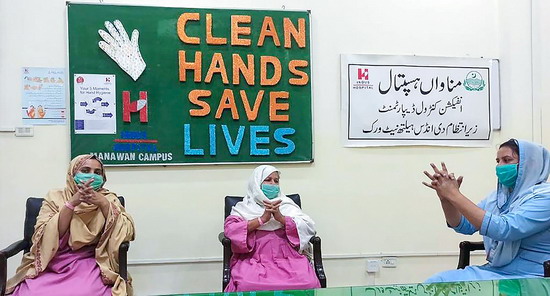According to the WHO Representative in Pakistan, Dr Palitha Mahipala, ensuring infection, prevention and control (IPC) standards across Pakistan is critically important as cases of COVID-19 continue to rise in the country every day. “Making sure that health care workers and health facilities are prioritizing IPC in their day-to-day activities can greatly minimize the possibility of health care-associated infections, whereas inadequate IPC measures can result in the transmission of infection to patients, health care facility staff, and visitors, and cause accelerated transmission within the community,” he said.
Reforming the health system
Since the onset of the outbreak in Pakistan, WHO Pakistan has been advocating for the improvement of IPC throughout the country and having “Clean Care” prioritized as a top agenda item in all high-level governmental meetings for COVID-19 preparedness and response.
The ‘Clean Care’ initiative is WHO’s call for urgent infection control reform in order to improve quality and outcomes in health facilities through the creation of better procedures, training, auditing and management processes.
Additionally, WHO Pakistan continues to work hard towards making IPC an integral part of COVID-19 response of the country. Assessments and activities with regards to IPC have highlighted several shortcomings and challenges being faced by health care facilities nationwide. In this regard, WHO Pakistan has generated several key recommendations to national governmental counterparts and partner agencies in order to strengthen compliance to IPC standards. These key recommendations include the formation and functionality of IPC committees nationwide, the development of SOPs based on the national IPC guidelines; training of staff in health care facilities; the development of related IEC material for health care workers; the procurement and distribution of essential PPE and sanitizers according to prevailing needs; and the establishment of monitoring systems to generate knowledge management practices on the implementation of IPC.
 WHO Pakistan is focusing on improving infection prevention and control (IPC) measure in the country's health facilities
WHO Pakistan is focusing on improving infection prevention and control (IPC) measure in the country's health facilities
Building policy through advocacy
To support the Government of Pakistan, WHO technical documents on IPC have also been translated and adapted to the Pakistan context for implementation and use by national, provincial and district governments to address the assessed gaps and improve IPC implementation. The easily applicable, stepwise guidelines are targeted towards health care workers, health care managers, IPC teams at the facility level, quarantine sites, points of entry, religious and public health authorities, and families.
WHO, as part of the National Technical Working Group, also assisted in the development of national guidelines for IPC. These guidelines were launched in April 2020 and signified a vital milestone for clean care. Following the launch, IPC committees were constituted in Punjab and Islamabad, with IPC focal persons and teams notified in several isolation facilities responding to COVID-19, highlighting the institutionalization of WHO recommendations.
Translating policy into practice
As the threat of the pandemic escalates, the need for coordination among partners and the Government over IPC standards has become more apparent. WHO chairs the partners Technical Working Group that meets fortnightly and allows United Nations agencies to share updates on their key activities and challenges related to IPC for COVID-19.
Moreover, to assess compliance to IPC guidelines first-hand, WHO Pakistan conducted 2 initial rapid assessment of health care facilities from 25 February to 5 March, 2020, with a focus on COVID-19 case management, IPC measures and water, sanitation and hygiene practices for IPC. The first assessment assessed the designation and case management facilities in 204 health care facilities in all major provinces of Pakistan, as well as some rural health centres and other PHC facilities in Khyber Pakthunkwa. The second assessment, conducted in April, comprised of follow up visits in 91 health facilities with COVID-19 isolation wards in all major provinces of Pakistan. These visits were aimed at overcoming gaps in implementation of IPC procedures, taking corrective and remedial actions where possible, providing on-the-job training to improve IPC knowledge, skills and practices and the development of improvement plans for the visited hospitals.
Simultaneously, WHO has played a significant role in imparting training to health care workers on important IPC practices. A mix of trainings has been designed and rolled out on IPC, including hands-on trainings for health care workers, IPC focal persons, and other relevant staff in the provinces, training of trainer workshops, and multiple online virtual trainings. A total of 12 210 health care workers have benefited from these trainings to date. Moreover, WHO has introduced innovative training approaches to share the latest information on COVID-19 such as the creation of a WhatsApp group, in collaboration with WHO Regional Office for the Eastern Mediterranean, which allows focal persons of more than 50 COVID-19 isolation wards in health facilities nationwide to impart the latest updates on WHO guidelines, as well as question and answer and trouble-shooting sessions to respond to the queries and prevailing challenges raised by group participants.


